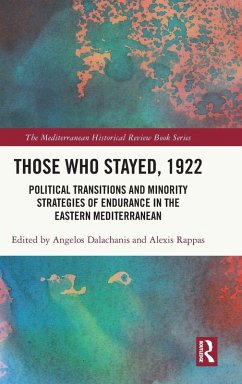Those Who Stayed, 1922
Political Transitions and Minority Strategies of Endurance in the Eastern Mediterranean
Herausgeber: Dalachanis, Angelos; Rappas, Alexis
Those Who Stayed, 1922
Political Transitions and Minority Strategies of Endurance in the Eastern Mediterranean
Herausgeber: Dalachanis, Angelos; Rappas, Alexis
- Gebundenes Buch
- Merkliste
- Auf die Merkliste
- Bewerten Bewerten
- Teilen
- Produkt teilen
- Produkterinnerung
- Produkterinnerung
The volume uses diverse methodologies-archival research, network analysis, microhistory, and translocal perspectives - to investigate the lived experiences of entrenched minorities.
Andere Kunden interessierten sich auch für
![With Those Who Wait With Those Who Wait]() Frances Wilson HuardWith Those Who Wait29,99 €
Frances Wilson HuardWith Those Who Wait29,99 €![With Those Who Wait With Those Who Wait]() Frances Wilson HuardWith Those Who Wait17,99 €
Frances Wilson HuardWith Those Who Wait17,99 €![The Next of Kin: Those who Wait and Wonder The Next of Kin: Those who Wait and Wonder]() Nellie L. McclungThe Next of Kin: Those who Wait and Wonder28,99 €
Nellie L. McclungThe Next of Kin: Those who Wait and Wonder28,99 €![Roll of Honour of Nairnshire: Containing Names and Addresses of Those in Each Parish Who Are Serving ... in the Great European War; 1915 Roll of Honour of Nairnshire: Containing Names and Addresses of Those in Each Parish Who Are Serving ... in the Great European War; 1915]() Roll of Honour of Nairnshire: Containing Names and Addresses of Those in Each Parish Who Are Serving ... in the Great European War; 191525,99 €
Roll of Honour of Nairnshire: Containing Names and Addresses of Those in Each Parish Who Are Serving ... in the Great European War; 191525,99 €![With Those Who Wait With Those Who Wait]() Frances Wilson HuardWith Those Who Wait25,99 €
Frances Wilson HuardWith Those Who Wait25,99 €![Comfort Thoughts for Those at Home Comfort Thoughts for Those at Home]() Comfort Thoughts for Those at Home25,99 €
Comfort Thoughts for Those at Home25,99 €![The Somme: By Those Who Were There The Somme: By Those Who Were There]() Bob CarruthersThe Somme: By Those Who Were There25,99 €
Bob CarruthersThe Somme: By Those Who Were There25,99 €-
-
-
The volume uses diverse methodologies-archival research, network analysis, microhistory, and translocal perspectives - to investigate the lived experiences of entrenched minorities.
Produktdetails
- Produktdetails
- Verlag: Routledge
- Seitenzahl: 236
- Erscheinungstermin: 30. September 2025
- Englisch
- Abmessung: 240mm x 161mm x 17mm
- Gewicht: 523g
- ISBN-13: 9781032792200
- ISBN-10: 1032792205
- Artikelnr.: 74064264
- Herstellerkennzeichnung
- Libri GmbH
- Europaallee 1
- 36244 Bad Hersfeld
- gpsr@libri.de
- Verlag: Routledge
- Seitenzahl: 236
- Erscheinungstermin: 30. September 2025
- Englisch
- Abmessung: 240mm x 161mm x 17mm
- Gewicht: 523g
- ISBN-13: 9781032792200
- ISBN-10: 1032792205
- Artikelnr.: 74064264
- Herstellerkennzeichnung
- Libri GmbH
- Europaallee 1
- 36244 Bad Hersfeld
- gpsr@libri.de
Angelos Dalachanis is a Researcher at the French National Centre for Scientific Research (CNRS), based at the Institute of Early Modern and Modern History in Paris. His research focuses on migration, labor and the Greek diaspora in the modern Eastern Mediterranean. He is the author of The Greek Exodus from Egypt: Diaspora Politics and Emigration, 1937-1962 (2017) and co-author of Monde rêvé, monde collectionné: la Méditérannée orientale d'Antonis Benakis (1900-1931) (2025). He co-directs the journal Diasporas. Circulations, migrations, histoire, and co-leads two research projects at the Ecole française d'Athènes on post-Ottoman minorities (with Alexis Rappas) and object circulation (with Mercedes Volait). Alexis Rappas is Associate Professor of History, and Associate Dean of the College of Social Sciences and Humanities at Koç University in Istanbul. His research focuses on the impact of European colonialism in post-Ottoman settings. He is the author of the Runciman award shortlisted book Cyprus in the 1930s: British Colonial Rule and the Roots of the Cyprus Conflict (2014). His subsequent research has focused on the entanglement between property and sovereignty in British Cyprus, the Italian Dodecanese and French Mandate Syria. He is in addition co-directing (with Angelos Dalachanis) an Ecole française d'Athènes five-year research project on minorities in the post-Ottoman Mediterranean.
Introduction: Minority Forms of Resilience in the Post-Ottoman World Part 1: Shifting Grounds for Transient Minorities Chapter 1 Civilising Mission or Reproduction of the Ottoman Governance? Minorities and Greek Imperial Formation in the Occupied Territories of Trabzon and Smyrna (1916-1922) Lukas Ts
pts
os Chapter 2 Catholic Entrenchment, Political Incertitude and Global Relief in Occupied Istanbul (1918-1923) Gabr
el John Doyle Part 2: Survival Beyond the State Chapter 3 Entrenchment of the Armenian Genocide: Memorialisation by the Patriarchate of Jerusalem as Diasporic Identity Politics Arman Khachatryan Chapter 4 Enduring a Transition: Cretan Jews in Post-Ottoman Hania Kater
na Anagnostak
Part 3: Resilience Within the Nation-State Chapter 5 "Let's Found the Jewish Secondary School This Year": A Debate on Schooling and Language in Hellenising Salonika (1926-1928) Defne Özözer Chapter 6 The Kingdom of Yugoslavia and Minorities in South Serbia Klara Volar
c Chapter 7 Economic Nationalism and Non-Muslims in Early Republican Turkey: The Limitations of Exclusion Sem
h Gökatalay Epilogue Language of Politics, Politics of Language Alexis W
ck
pts
os Chapter 2 Catholic Entrenchment, Political Incertitude and Global Relief in Occupied Istanbul (1918-1923) Gabr
el John Doyle Part 2: Survival Beyond the State Chapter 3 Entrenchment of the Armenian Genocide: Memorialisation by the Patriarchate of Jerusalem as Diasporic Identity Politics Arman Khachatryan Chapter 4 Enduring a Transition: Cretan Jews in Post-Ottoman Hania Kater
na Anagnostak
Part 3: Resilience Within the Nation-State Chapter 5 "Let's Found the Jewish Secondary School This Year": A Debate on Schooling and Language in Hellenising Salonika (1926-1928) Defne Özözer Chapter 6 The Kingdom of Yugoslavia and Minorities in South Serbia Klara Volar
c Chapter 7 Economic Nationalism and Non-Muslims in Early Republican Turkey: The Limitations of Exclusion Sem
h Gökatalay Epilogue Language of Politics, Politics of Language Alexis W
ck
Introduction: Minority Forms of Resilience in the Post-Ottoman World Part 1: Shifting Grounds for Transient Minorities Chapter 1 Civilising Mission or Reproduction of the Ottoman Governance? Minorities and Greek Imperial Formation in the Occupied Territories of Trabzon and Smyrna (1916-1922) Lukas Ts
pts
os Chapter 2 Catholic Entrenchment, Political Incertitude and Global Relief in Occupied Istanbul (1918-1923) Gabr
el John Doyle Part 2: Survival Beyond the State Chapter 3 Entrenchment of the Armenian Genocide: Memorialisation by the Patriarchate of Jerusalem as Diasporic Identity Politics Arman Khachatryan Chapter 4 Enduring a Transition: Cretan Jews in Post-Ottoman Hania Kater
na Anagnostak
Part 3: Resilience Within the Nation-State Chapter 5 "Let's Found the Jewish Secondary School This Year": A Debate on Schooling and Language in Hellenising Salonika (1926-1928) Defne Özözer Chapter 6 The Kingdom of Yugoslavia and Minorities in South Serbia Klara Volar
c Chapter 7 Economic Nationalism and Non-Muslims in Early Republican Turkey: The Limitations of Exclusion Sem
h Gökatalay Epilogue Language of Politics, Politics of Language Alexis W
ck
pts
os Chapter 2 Catholic Entrenchment, Political Incertitude and Global Relief in Occupied Istanbul (1918-1923) Gabr
el John Doyle Part 2: Survival Beyond the State Chapter 3 Entrenchment of the Armenian Genocide: Memorialisation by the Patriarchate of Jerusalem as Diasporic Identity Politics Arman Khachatryan Chapter 4 Enduring a Transition: Cretan Jews in Post-Ottoman Hania Kater
na Anagnostak
Part 3: Resilience Within the Nation-State Chapter 5 "Let's Found the Jewish Secondary School This Year": A Debate on Schooling and Language in Hellenising Salonika (1926-1928) Defne Özözer Chapter 6 The Kingdom of Yugoslavia and Minorities in South Serbia Klara Volar
c Chapter 7 Economic Nationalism and Non-Muslims in Early Republican Turkey: The Limitations of Exclusion Sem
h Gökatalay Epilogue Language of Politics, Politics of Language Alexis W
ck








